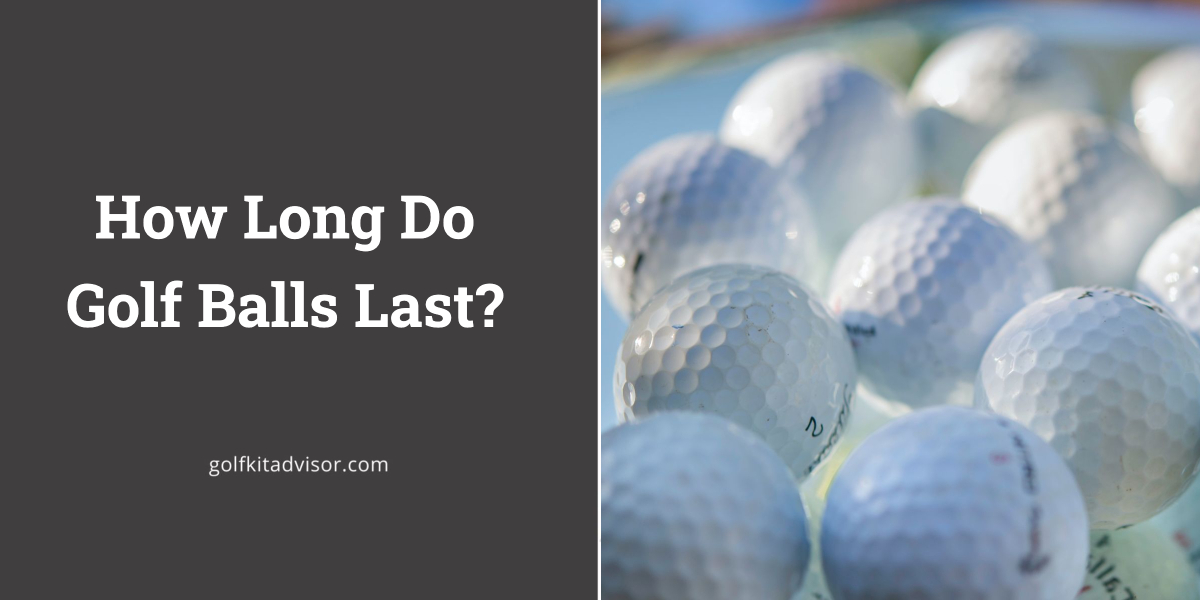Golf balls are an essential part of the game, but how long do they last?
In this blog post, we’ll explore the lifespan of golf balls and provide tips on how to make them last longer. We’ll also discuss the different golf balls available and which are best for your game. Read on to find out more!
Table of Contents
Titleist Research: What to Expect From Golf Balls
Titleist is a leading golf ball manufacturer and researches to ensure that its products meet the highest performance and durability standards. Titleist has shown that their golf balls can last up to five years if stored in normal indoor conditions, away from excessive heat.
Used golf balls that have spent up to three months underwater are almost identical to new balls. This suggests that golf balls can still be reliable for a long time, even when used in tough conditions. With such a commitment to quality and longevity, it’s no wonder Titleist is a trusted brand in golf.
Daryl Pacinella’s Insight on Unused Golf Balls
Daryl Pacinella is an acclaimed Top 100 instructor in the United States and has some interesting insight on new golf balls. He suggests that modern golf balls could last ‘forever if kept in optimal conditions.’ This starkly contrasts with the five to ten-year estimates for new golf balls suggested by some.
His advice is to keep new golf balls away from extreme temperatures and away from other used balls, as this will help them retain their shape and performance for longer. Additionally, he recommends that if golf balls have been stored for several years, they should still be fine to use. With his advice, you can know that your new golf balls will last a long time.
How Many Rounds Can You Play With a Golf Ball?
Most golfers are curious about the longevity of their golf balls, and the answer is not exact. Depending on your clubhead speed, you can expect a ball to last anywhere from seven to 10 rounds of golf.
A premium ball should last even longer since it is designed to withstand up to 100 tee-shot strikes. If you want the most life out of your golf balls, ensure you don’t hit them against any hard surfaces and store them properly when not in use. With proper storage and careful use, you can be sure that your golf balls will last until you’re ready to switch them out.
What Conditions Should You Store Unused Golf Balls?
When storing new golf balls, it’s important to keep them in ideal conditions for maximum longevity. Unused golf balls should be stored away from excessive heat and humidity, as these can cause the ball to degrade over time.
It’s also important to keep the golf balls away from other items that could damage them, such as sharp objects or direct sunlight. Storing golf balls in a dry, cool place with minimal movement can help preserve their lifespan and ensure they are still playable after years of storage.
What Happens When You Store Used and Unused Golf Balls Together?
Storing used and unused golf balls together can hurt the performance and longevity of both types. When stored together, the used golf balls will start to lose their dimples, which affects their performance.
This can also cause the new golf balls to wear down faster than usual due to increased friction. Additionally, the oils and dirt from the used golf balls can transfer onto the new golf balls, leaving them dirty and less aerodynamic. For this reason, it is important to store used and unused golf balls separately to maximize their performance and longevity.
Can You Play With an Old Golf Ball?
Can you play with an old golf ball? It might seem counterintuitive, but you can play with an old golf ball if it is still in good condition. A golf ball that is not visibly damaged can be used for up to seven 18-hole rounds without any loss of performance.
Additionally, wound balls stored in reasonable conditions are estimated to have lost only 0.5 to 1.0% of their initial velocity after 10 years, making them suitable for use. However, it is important to note that the performance of an old golf ball can be affected by extreme cold or heat and so it is best to store them in a cool, dry place. You can get many rounds of play out of an older golf ball with proper care and storage.
How to Store Golf Balls for Maximum Longevity
Storing golf balls for maximum longevity requires keeping them in ideal conditions. Unused golf balls should be kept away from extreme temperatures and direct sunlight. Store them in a cool, dry place, like a garage or closet, for optimal preservation.
For golf balls used in games, keep them in a separate container from the new golf balls so they don’t rub together. Additionally, you should rotate your stock of golf balls every few years to ensure they stay in the best condition possible. Your golf balls can last for many years with proper storage and care.
Do Golf Balls Expire?
Golfers around the world often ask if golf balls expire. The answer is yes, they do. Golf balls are made up of two main components – a rubber core and an outer casing, and both of these components can degrade over time.
The rubber core will eventually lose its elasticity, affecting the ball’s performance, and the outer casing can crack or chip, resulting in poor flight and spin characteristics. In addition, prolonged exposure to extreme temperatures or humidity may cause golf balls to become brittle and lose their performance.
How Can You Tell if a Golf Ball is Too Old To Play With?
It can be difficult to tell if a golf ball is too old to play with. Signs of wear and tear, such as visible scuffs, are obvious signs that it is time for a new ball. However, there are other signs you can look for to determine if a golf ball is too old to play with.
For example, if your ball has lost its initial velocity (IV) and you notice a decrease in distance and accuracy, it may be time to replace it. You can also check the ball’s compression rating; if it is lower than the industry standard of 90-100, it may be too old.
Finally, if the ball has been stored in extreme temperatures or humid conditions, it may have degraded over time and should be replaced. It is important to regularly inspect your golf balls for any signs of wear or damage so you can enjoy your game with top-quality equipment.
Conclusion: How Long Will Golf Balls Last?
In conclusion, the lifespan of a golf ball largely depends on the environment in which it is stored and how it is used. Unused golf balls stored in ideal conditions can last up to 10 years, while modern golf balls stored in optimal environments can last up to five years.
Used golf balls, however, will likely not last as long as new golf balls due to wear and tear. Golfers should remember that golf balls can lose performance after seven rounds without visible damage, so they should know when to replace them. It is important to store your golf balls correctly to ensure maximum longevity.

